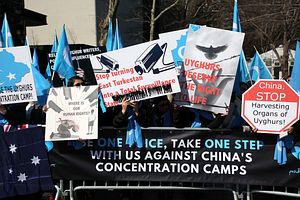China’s old sicknesses of totalitarian rule and genocide are back. As revealed in the U.S. Congressional Executive Commission on China Annual Report, Beijing has enacted a sweeping program of ethnic cleansing against minority populations in its Xinjiang region. With over 1 million people “disappeared” as of early 2018, presumably into Xinjiang’s booming re-education centers, it should be clear to all that President Xi Jinping has reclaimed the genocidal heritage of Mao Zedong. Considering Beijing’s prodigious ability to isolate large groups of citizens – and its history of violence on a genocidal scale – we must assume this number is far from the whole of the crime.
Compared to China’s population of 1.4 billion, we may be tempted to dismiss the detention of over 1 million Uyghurs, Kazakhs, and other minorities in the Xinjiang region as being small in scale. Indeed, Mao’s program of destruction killed and imprisoned many more. The government in Beijing is still mostly pragmatic, basing most of its decisions on risk versus reward rather than a dogmatic program.
But Hannah Arendt teaches us that the system of totalitarianism is based on relentless expansion… until utter and catastrophic collapse. This expansion occurs in both scope and cruelty, proving that “everything is possible” and “everything is permitted.” This dehumanization is precisely why we cannot permit China to commit these crimes. Lesser evils today may become insurmountable tomorrow. Indeed, there was little or no reason for China’s rulers to fear trouble from Xinjiang in the first place. It is an act of paranoia, one we cannot lightly dismiss.
International relations normally call for careful evaluation of interests, risk, and reward and a plan aligning ends, means, and ways. The United States is currently using this process to determine how best to compete with China. But crimes against humanity are different. Ways and means can never substitute for right and wrong. If the right becomes too much harder than the wrong, cool analysis will provide ready justification for inaction. It was only in retrospect that we saw how sacrificing our values bought us nothing at Munich.
The Washington Post suggests demanding that China open Xinjiang to international inspections, but this is a purely symbolic demand. Should we fail to follow up, it would become a tacit recognition of China’s right to commit ethnic cleansing. And if we fail to act in a timely fashion, China’s ethnic cleansing will become a fait accompli.
Although the United States has never endorsed China’s Communist form of government, when that government concerned itself first with the wellbeing of its people and was not a malicious actor internationally, there was no obstacle to harmonious relations. But now that the People’s Republic has returned to its genocidal foundations, how can the United States or other democratic governments continue their normal commerce?
For the United States’ part, Congress should impose heavy economic sanctions until China ceases its program of ethnic cleansing. It may be impractical to enact massive restrictions all at once, but that too is a tool, allowing time for China to feel the pain and see more pain ahead. Hopefully, it will move her back to a more normal stance.
There will always be a thousand reasons to do nothing. Part of China’s strategy is confusing the issue to thwart action on the part of its opponents. The United States has a mixed record on resisting ethnic cleansing. We’ve already let it get this far. We aren’t going to invade China. But none of this is an excuse to forget our friends or what is right.
If we act decisively to impose steep costs now — while earnestly and clearly holding out the possibility of rebuilding all that has been lost — we may yet shock Beijing back into the comity of nations. Fail to do so, and we risk giving license to tyranny, an approval we will later have to claw back at great cost. Democratic peoples in every land must now make a leap of moral imagination: We are all Uyghurs. We are all Kazakh, Kyrgyz, and Hui. China must understand that all those it has targeted for annihilation are our people. It may be we can’t save everyone, but we will not sit idly by while China attacks us.
Ben Lowsen is a China strategist for the U.S. Air Force Checkmate strategic studies office. He tweets at @lowsen88. The views expressed are the author’s own and do not reflect the official policy or position of the U.S. Air Force, Department of Defense, or the U.S. Government
































